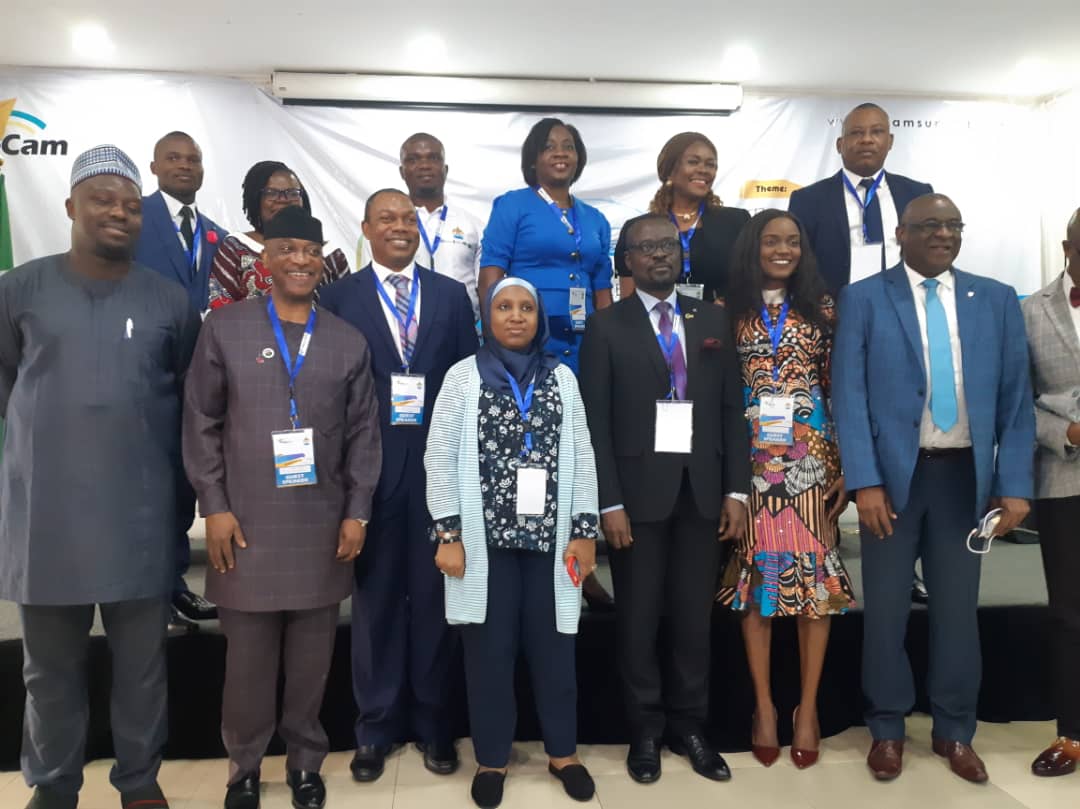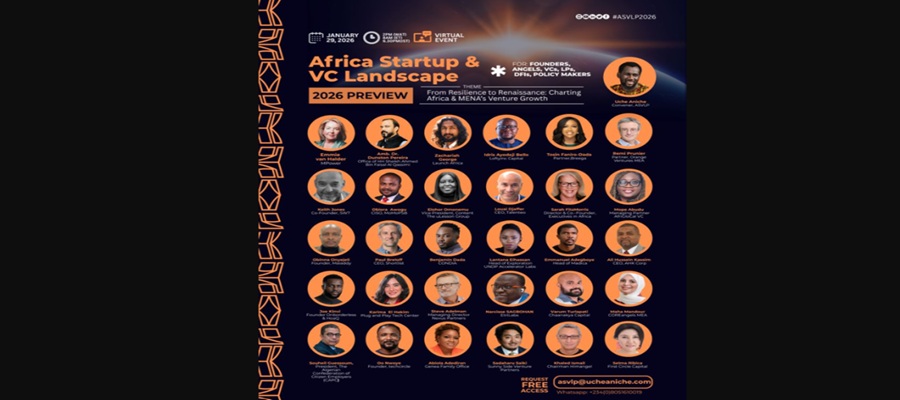Telecom
FG Pledges Support for the Use of ICT in Export Industry

The ministry of communications has said that it will fully align with the calls for the use of ICT to provide valuable insight on current trends and practices in the export industry.
Mr. M F Istifanus, Permanent Secertary, Ministry of Communications stated this at the just concluded Nigerian Export Summit and Awards 2019, with the theme: “The Digital Era, Business on the Move: Export in the Fast Lane,’’ held at Victoria Island, Lagos and was organised by AFRITEX.
Mr Istifanus who was represented by Dr. Patrick Oghuma, Technical Assistant, Ministry of Communications said that ministry aligns with the aim of the summit which is using ICT to provide valuable insight on current trends and practices in the export industry.
He noted that the export sector can play a facilitator’s role in boosting the economy and creating new wealth and entrepreneurship in our communities, stressing also that they are determined to roll out essential ICT services to all citizens, especially those who live in underserviced areas of the country.
The permanent secretary stated that the role of ICT in our economy cannot be overemphasized; saying that it is currently contributing up to 10.11% of Nigeria’s GDP and had created over 10 million jobs in the past 10 years.
According to him, “ICT is currently contributing up to 10.11% of Nigeria’s GDP and had created over 10 million jobs in the past 10 years.
“Development in the ICT sector has provided well over $70 billion in foreign direct investment (FDI) over the last 15 years.
“It is indeed one of the fastest growing sectors of the Nigerian economy and is the second largest ICT market in Africa”.
He stated that government will offer every support to ensure that our local ICT firms (service providers and manufacturers) have a qualitative competitive advantage over others.
“We as a government will offer every support to ensure that our local ICT firms (service providers and manufacturers) have a qualitative competitive advantage over others.
“We need to work together to seize this window of opportunity to deliver the potential this sector promises by exploring ICT export.
“If we do so, Nigeria’s Information and Communications Technology sector will attract international investors.
“As a Government, we are determined not just to restore growth, but growth that is diversified, inclusive; sustainable and robust in the long term, irrespective of whatever happens to the price of crude oil.
“This ICT and Telecom sector should be able to export products and services, he added
Amb. Ayoola Olukanni, Director-General, Nigerian Association of Chambers of Commerce, Industry, Mines and Agriculture (NACCIMA) speaking at the event, urged exporters to utilise Information and Communications Technology (ICT) to boost exports in the country.
He said that Nigerians in diaspora had a huge export potential and if technology was well utilised in the sector, it would boost the nation’s chances of working with other countries.
“Nigerians in the sector also need to keep up with global best practices when exporting to other countries.
“It is also necessary to adhere to rules and regulations when exporting to other countries,’’ he said.
Olukanni said that electronic media and e-commerce had also helped many Nigerians to showcase their products to the world.
He also noted that the Central Bank of Nigeria (CBN) had taken measures that would increase and diversify exports in Nigeria..
Telecom
Amazon Axes 16,000 Jobs Worldwide in Major Restructuring Push

Amazon, the world’s largest e-commerce and cloud computing powerhouse, announced plans Wednesday to eliminate 16,000 jobs globally, escalating a restructuring drive first flagged in October with 14,000 earlier cuts.

Amazon
The layoffs, hitting corporate ranks across multiple divisions, aim to slash management layers, boost accountability, and dismantle bureaucracy, Senior Vice President Beth Galetti stated in an internal memo. Despite booming holiday sales and $21 billion quarterly profits on $180 billion revenue, Amazon seeks to redirect resources toward massive artificial intelligence investments amid slower post-pandemic growth and rising costs.
Galetti explained that while some teams finalised October adjustments, others required extended reviews, pushing total reductions toward 30,000—the firm’s largest ever. CEO Andy Jassy, pursuing leaner operations since 2021, has long signalled AI’s role in shrinking white-collar headcount, with corporate staff—about 350,000 of 1.5 million total—bearing the brunt, sparing warehouses.
The move mirrors Big Tech’s broader belt-tightening as firms recalibrate pandemic-era hiring binges against economic headwinds, AI disruption, and policy uncertainties under President Donald Trump. Amazon’s October cuts struck 2,000 in Washington state—including engineers, recruiters, analysts—and 1,500 in California, with fresh impacts undisclosed by location.
Jassy emphasised culture over pure finances in prior notes, blaming rapid expansion for excess layers after workforce doubling during COVID lockdowns fueled online shopping surges. Recent U.S. hiring slowdowns—to 50,000 jobs in December—underscore corporate caution amid AI’s job-shifting potential and tariff worries.
Analysts note the cuts free capital for AI dominance, pitting Amazon against rivals in generative tools despite no immediate financial distress. Ex-workers have decried impersonal processes, often learning via media leaks, highlighting tensions in Earth’s “best employer” shedding talent en masse.
As tech pivots to AI frontiers, Amazon’s aggressive pruning signals a new era: fewer bodies, sharper focus, betting machine smarts eclipse human scale in the post-boom landscape.
Telecom
Police Bust ₦7.7bn Telecom Hack Gang, Seize 400 Laptops in Massive Fraud Swoop

Operatives of the Nigeria Police Force smashed a sophisticated cybercrime ring Wednesday, arresting six suspects accused of hacking a major telecommunications company and looting airtime and mobile data worth a staggering N7.7 billion.

The Force Public Relations Officer, CSP Benjamin Hundeyin, disclosed in a statement that the suspects breached the telecom giant’s core billing and payment systems by compromising internal staff login credentials, enabling them to siphon off vast quantities of airtime and data for illicit resale.
Named in the arrests are Ahmad Bala, Karibu Mohammed Shehu, Umar Habib, Obinna Ananaba, Ibrahim Shehu, and Masa’ud Sa’ad – a mix of northern and southern names hinting at a cross-regional fraud network that preyed on Nigeria’s digital backbone.
Police swooped on the gang’s hideouts in coordinated raids across Kano and Katsina states in October 2025, with a final takedown in the Federal Capital Territory, recovering two mini-plazas masquerading as legitimate retail outlets stocked with over 400 laptops, about 1,000 mobile phones, and a Toyota vehicle.
Investigators also froze substantial sums in the suspects’ bank accounts, tracing the dirty money trail back to the diverted resources that left the unnamed telecom firm reeling from unauthorised activities reported in a desperate petition.
The breach, described by police as a “calculated assault on critical infrastructure,” allowed the hackers to manipulate the company’s systems undetected for months, offloading billions in airtime and data bundles through underground channels and raking in illicit profits.
Hundeyin vowed that the net was widening, with forensic experts combing through digital footprints and financial ledgers to expose any remaining accomplices or beneficiaries in what he called “one of the largest telecom heists in recent Nigerian history.”
Inspector-General of Police, IGP Kayode Adeolu Egbetokun, praised the crack team from the National Cybercrime Centre for their “relentless professionalism,” urging telecom firms to bolster cybersecurity amid a surge in digital predation.
As the suspects cool their heels awaiting arraignment under the Cybercrimes (Prohibition, Prevention) Act, the case underscores Nigeria’s growing battle against tech-savvy fraudsters targeting the N1.7 trillion telecom sector that powers millions of daily transactions.
Industry watchers warn that such breaches erode investor confidence and hike operational costs, ultimately passed onto consumers already grappling with soaring data tariffs in Africa’s most populous nation
Telecom
ASVLP 2026: Africa, MENA VCs Gear Up as Tech Funding Hits $4.1bn Rebound

As Africa and MENA’s startup ecosystems transition from post-correction resilience into a new phase of disciplined growth, the Africa Startup & VC Landscape Preview (ASVLP 2026) will convene leading founders, investors, policymakers, and ecosystem builders on January 29, 2026, for its second annual, agenda-setting virtual forum.

Following a challenging global venture cycle, 2025 marked a notable rebound across the African ecosystem, with startups raising an estimated $3.2–$3.3 billion over the full year.
The recovery was accompanied by significant structural shifts: Kenya emerged as the leading destination among Africa’s “Big Four” markets for the first time, while Nigeria recorded a year-on-year funding decline, reflecting changing investor preferences, macroeconomic pressures, and a broader recalibration toward capital efficiency and sustainability.
Sectorally, fintech remained the most funded vertical, while climate & energy, AI-enabled solutions, healthtech, and infrastructure-adjacent businesses gained increasing attention. Across Africa and MENA, development finance institutions (DFIs) and family offices played a more pronounced role in anchoring funds, deploying catalytic capital, and supporting blended-finance structures, reshaping how early-stage and growth capital is mobilized.
ASVLP 2026 is designed to translate these data points into forward-looking strategy.
The forum will bring together venture capitalists, angel investors, LPs, DFIs, family offices, founders, corporate leaders, and regulators from Africa, MENA, Europe, and North America to assess 2025 outcomes and chart priorities for 2026.
The program will feature keynotes, fireside chats, panels, and deep-dive roundtables, including discussions on:
· The 2026 Africa & MENA FinTech Landscape, focusing on security, profitability, regulation, and growth frontiers
· Emerging Fund Managers, capital formation, and LP alignment
· Talent, operator depth, and institutional capacity as constraints to scale
· Regulatory evolution and cross-border market integration
A major highlight of ASVLP 2026 will be the Final DealRoom Pitch Session, where a curated group of high-potential startups will present to an experienced panel of investors.
• Founders can apply to pitch via: bit.ly/ASVLP-DR-Founders
• Investors seeking DealRoom access can request entry via: bit.ly/ASVLP-DR-Investors
Confirmed speakers for ASVLP 2026 include Khaled Ismail (HIMangel), Idris Ayodeji Bello (LoftyInc Capital), Zachariah George (Launch Africa), Tosin Faniro-Dada (Breega), Selma Ribica (FirstCircle Capital), Maha Mandour (COREangels MEA), Joe Kinvi (Borderless), Remi Prunier (Orange Ventures MEA), Karima El Hakim (Plug and Play Tech Center), Souheil Guessoum (President, The Confederation of Citizen Employers – Algeria (CAPC)), Remi Prunier (Partner, Orange Ventures, MEA), Maha Mandour (COREAngels MEA), Ali Hussein (President, Kenyan FinTech Association), Patrick Okebu (CIO, Interswitch Group) among other leading voices shaping capital, policy, and innovation across the region.
“The conversation has shifted,” said Uche Aniche, Convener of ASVLP. “It’s no longer about whether capital will return to Africa and MENA, but what kind of capital, deployed with what discipline, and in service of which long-term outcomes. ASVLP exists to help the ecosystem make sense of that transition.”
Participation in ASVLP 2026 is free but strictly by invitation.
Interested participants are encouraged to repost the official announcement on LinkedIn and comment #ASVLP2026 to receive a private registration link. They could also email [email protected] and request invite.

 E-Financial3 days ago
E-Financial3 days agoCBN Upgrades Licences of Opay, Moniepoint, Kuda, Palmpay, Paga to National Status
- E-Financial3 days ago
Nigeria’s 9 Top FinTech Firms Valued at $10.6Bn in January 2026

 News3 days ago
News3 days agoTech Executives Double Down on AI, Talent and Adaptive Strategies to Lead in the Intelligence Age

 E-Financial3 days ago
E-Financial3 days agoNIBBS to Boost Financial Inclusion with Offline Payment Solutions

 News3 days ago
News3 days agoDHQ Indicts Brigadier General Abubakar Sadiq, 15 Others in Alleged Coup Plot againt Tinubu

 E-Financial2 days ago
E-Financial2 days agoPayPal Goes Live in Nigeria through Paga

 E-Business3 days ago
E-Business3 days agoFirm Identifies AI as Common Denominator in Entertainment Industry’s 2026 Security Threats

 Broadcasting2 days ago
Broadcasting2 days agoNITDA, NBC Explore Strategic Collaboration on Digital Transformation, Media Regulation

















